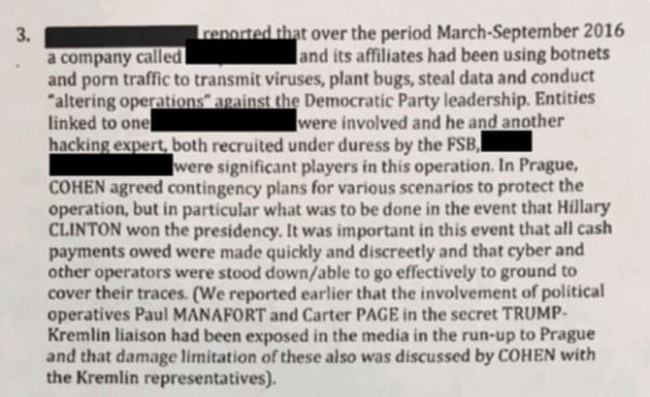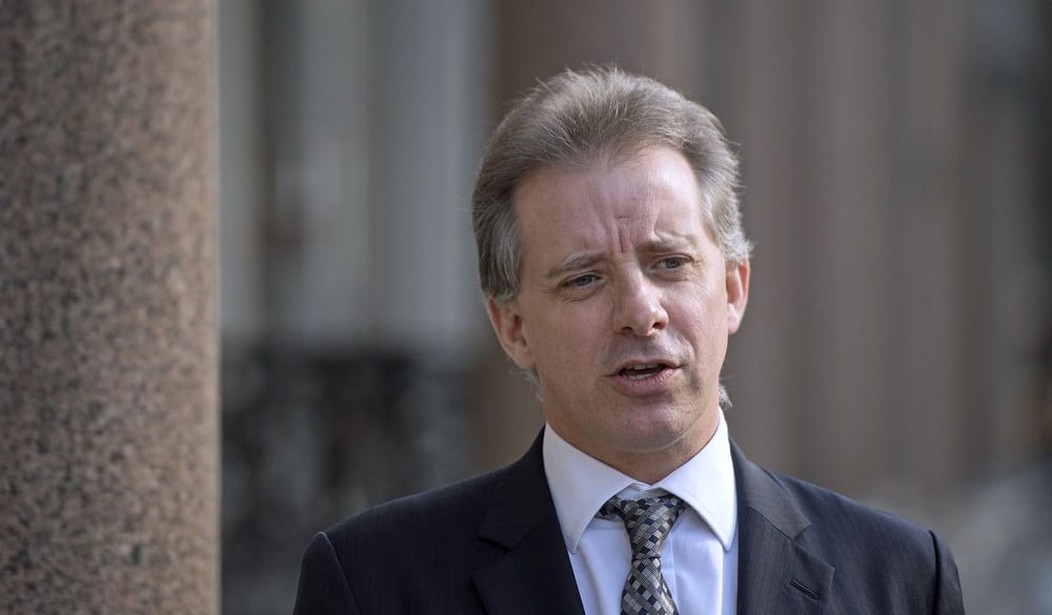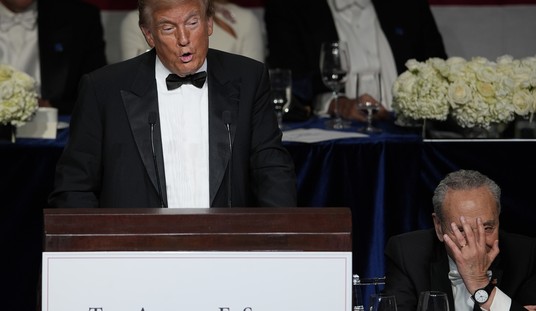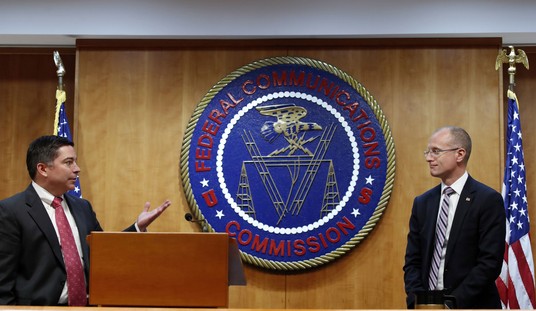It is gradually becoming clear that the central, perhaps only, evidence in the investigation of alleged “collusion” between some/all members of the Trump campaign and Russian intelligence to enable Trump to pull off an Electoral College win though losing the popular vote is the “dossier” compiled by former British intelligence operative Lexington Christopher Steele.
Parts of the dossier are known to be dodgy. Parts of it seem to be composed of information the British intelligence apparatus had either passed to the US, or that the US had passed to the Brits, and Steel obtained access to via his circle of contacts. Steele seems to have salted his dossier with enough valid intelligence that is gave an air of credibility to the whole thing. In fact, the FBI deemed is sufficiently credible that they offered to pay Steele for more work and they used the dossier, the one you say in BuzzFeed, as part of the evidence to get FISA surveillance authorized on Carter Page.
One part, in particular, that has come under scrutiny is this paragraph:

The redactions cover the issue.
The entry names the convict in the same paragraph as Aleksej Gubarev, a tech executive who is head of the web hosting companies, Webzilla and XBT Holdings.
In that paragraph, the dossier states that Gubarev’s companies and “affiliates had been using botnets and porn traffic to transmit viruses, plant bugs, steal data and conduct ‘altering operations’ against the Democratic Party leadership.”
The memo alleges that Gubarev and Kaptsugovich were recruited “under duress” by Russia’s spy services and were “were significant players” in the operation to hack Democrats.
But Gubarev strongly denies having been recruited by Russian spies or taking part in any cyber attacks. He is suing BuzzFeed News for publishing his name in the dossier. The website responded to the suit by apologizing to Gubarev and redacting his name from the online version of the document. (RELATED: Russian Tech Exec Sues BuzzFeed For Publishing His Name In Dossier)
BuzzFeed also appears to have redacted Kaptsugovich’s name since its first publication of the dossier, though it is unclear why.
Evan Fray-Witzer, a lawyer for Gubarev, told The Daily Caller on Friday that there is “no connection whatsoever” between Kaptsugovich and his client.
“Kaptsugovich has never worked for XBT or Webzilla, has no connections to XBT or Webzilla, and Mr. Gubarev does not know him, nor has he ever met him,” Fray-Witzer said, noting that the dossier itself does not allege that Kaptsugovich worked for or was connected in any way to Gubarev’s companies.
“We know that the allegations in the dossier [published by Buzzfeed] concerning Mr. Gubarev, XBT, and Webzilla are wholly without factual basis but, beyond that, we cannot say what role others may have played in the hacking of the DNC.”
The interesting part is the “convict” mentioned. That would be Sevastyan Kaptsugovich. His involvement creates a particular problem. Via McClatchy:
Kaptsugovich was first arrested on pedophilia charges in Russia in March 2001 and was sentenced in January 2004 to 11 years in Solikamsk prison, known in Russia as a tough lockup. The arrest came about the same time the United States and Russia announced a successful joint effort called Project Blue Orchid that smashed an international pedophilia ring.
The joint law enforcement effort was shocking because it involved pedophiles from the United States and elsewhere traveling to Russia to have sex with young boys who’d been plucked from poor rural homes on promises of a better life in the city. Instead, they were sexually abused and images of the horrific acts sold across the globe.
…
Sevastyan Kaptsugovich, believed now to be at least 45, was released before his full sentence was completed. He made headlines again when he was convicted a second time, on Feb. 14, 2013, for similar crimes and sentenced to more than 18 years in a penal colony…
…
McClatchy has confirmed through a Russian human rights activist that Kaptsugovich is imprisoned in a facility known as IK-29 near the village of Sorda in the region of Kirov. That’s about 500 miles northeast of Moscow.“I did visit IK-29 on Feb. 17 of this year. During the visit I saw Sevastyan Kaptsugovich,” Arthur Abashev wrote to McClatchy. “Indeed, he is an inmate there, and he works in the prison administration office. He does not have access to the internet, a computer or a mobile phone. He only has access to the landline phone.”
At the least, the involvement of Mr. Kaptsugovich seems very unlikely.
One would think that having some dodgy material in a document would give you reason do doubt more of what’s in the document. After all, an instrument that gives inaccurate readings interspersed with accurate readings is much worse than having no instrument whatsoever. That doesn’t seem to be the way either the FBI or the FISA courts operate:
Ron Hosko, who served as assistant director of the FBI’s criminal division until 2014, says that he has confidence that FBI officials properly vetted the dossier, even if some parts of the document are inaccurate.
“They wouldn’t be just dropping an unvalidated dossier in the middle of a surveillance warrant application and treating it as if it was true in its entirety. They may well take pieces of it, characterize the source of the information, talk about how they independently validated it,” he told TheDC.
Taking pieces that have been validated without mentioning the pieces that aren’t validated or, in this case, blatantly false doesn’t seem like a very good system to me.













Join the conversation as a VIP Member